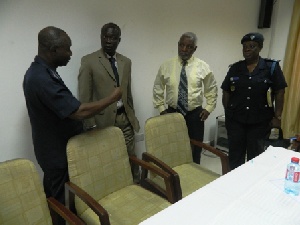Mr Edwin Nii Lantey Vanderpuye, Deputy Minister of Trade and Industry would be in Brussels this week to join a global meeting of ongoing efforts to streamline the harmonised system (HS) and customs tariff nomenclature.
The HS is an internally standardised system of names and numbers for classifying traded products developed and maintained by the World Customs Organisation.
The HS code is used by customs agencies worldwide to assess duties, collect trade statistics and generally to control imports and exports.
Under the HS Convention, the contracting parties are obliged to base their schedules on the HS nomenclature, although the parties set their own rates of duty.
Mr Vanderpuye was speaking at the close of a month-long course organised by Inspection and Control Services (ICS), on “Custom Tariff Nomenclature: Expanding the Knowledge Base.”
It was part of ICS contractual agreement with government in the transfer of technology.
The two-tier course attracted participants from the Customs Division of Ghana Revenue Authority, Ministry of Trade and Industry, the Economic and Organised Crime office, and was meant to equip the personnel to be abreast of the best practices in the classification process.
Mr Vanderpuye said the course was meant to increase Ghana’s competitiveness in international and domestic markets, improve economic regulation for business and consumers, ensure speedy and efficient clearance of goods, and eventually reduce cost of doing business.
“It was also a strategy the government put in place to implement the WTO (World Trade Organisation) Agreement on Customs Valuation to ensure minimum loss of revenue and enhance the operating trade regime in Ghana with the view to positioning the country as the commercial and maritime hub of the West African sub-region,” he said
Mr Vanderpuye also spoke about the essence of the Common Free Trade Area in the West African sub-region, which he said would reduce the time of doing business at the ports.
Most of these multilateral agreements are signed between neighbouring countries, and the Economic Community of West African States (ECOWAS) Trade Liberalisation Scheme is the main ECOWAS operational tool for promoting the region’s Free Trade Area.
This is in tandem with one of the objectives of the community which is the establishment of a common market through the liberalisation of trade by the abolition, among Member States, of customs duties levied on imports and exports, and the abolition among Member States of non-tariff barriers.
Mr Isaac Osei Bonsu, Human Resource Director of ICS said classification of imports is a very important aspect in the destination inspection scheme and is a key pre-requisite to effectively performing key functions such as valuation, computerised risk analysis and statistical reporting on key import and trade parameters.
He said the course was part of a contractual agreement of ICS with government to ensure adequate training of local staff and management of key stakeholders in the destination inspection scheme.
Mr Wallace Akondor, Assistant Commissioner of Customs noted that without HS, international trade would have been haphazard and confusing.
He said HS is a global tool for global efforts to identify chemical waste, narcotics, precursors, chemicals use for biological weapons among other uses.
Ms Sylvia Asana Dauda Owoo, Head of Freights and Logistics at Ghana Shippers Authority, who chaired the function, said HS would help facilitate business at the ports.
ICS-Ghana started operations in January 2003 and is part of the ICS Group, which comprises various firms with extensive e-government experience and international infrastructure.
The group assists governments in enhancing trade revenue while maintaining controls and facilitating trade.
ICS was established in 1996 to provide governments with effective services designed to enhance customs and tax revenues.
Business News of Monday, 9 December 2013
Source: GNA













